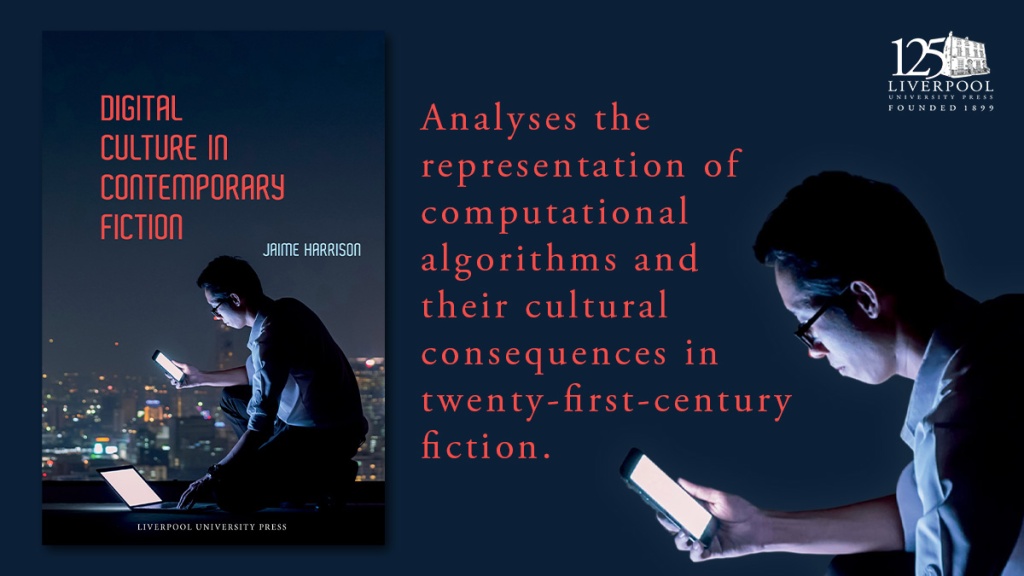Digital Culture in Contemporary Fiction offers the first analysis of the representation of computational algorithms and their cultural consequences in twenty-first-century fiction, defining an emerging tradition of fiction attempting to redefine the novel’s relevance within digital culture. In this blog post, author Jaime Harrison delves into how, coinciding with the completion of his manuscript, the public conversation surrounding digital culture underwent a significant transformation following the introduction of ChatGPT.

To say that public discourse on digital culture shifted somewhat following the 30 November 2022, the day OpenAI released ChatGPT, feels like an understatement. Artificial intelligence had already seen increased attention earlier in the year with the launch of text-to-image platform DALL-E 2 and software engineer Blake Lemoine’s firing from Google for leaking logs from chatbot LaMDA and claiming it was sentient. The subsequent launch of OpenAI’s chatbot elevated the technology underpinning these platforms to the status of public event in a way it had never been before. While natural language processing, neural networks, machine learning had been familiar concepts in the realms of academic and corporate research for decades, their disruptive potential became the subject of everyday discussion and, often, trepidation. Various industries began to question how such technology may benefit or displace them, while other questions were raised on how, with such tools at their fingertips, anyone could be trusted to have produced creative work without the aid of AI. Teaching colleagues have, no doubt, at least one paper they’ve scrutinised to determine if its irregular cadences were that of an algorithmic body snatcher.
I submitted the manuscript for Digital Culture in Contemporary Fiction a month before ChatGPT’s launch. A book of literary criticism, it is concerned with how recent novels reflect and reflect upon how modern digital technology shapes our present moment, with case studies focusing on three traditional novels (Joshua Cohen’s Book of Numbers, Nicola Barker’s H(A)PPY, Neal Stephenson’s Fall; or, Dodge in Hell) and, as an example of digital culture responding to itself, one visual novel (Grasshopper Manufacture’s The 25th Ward: The Silver Case). Fiction has engaged with information technology for as long as it has existed, from the conclusion of Thomas Pynchon’s The Crying of Lot 49, in which protagonist Oedipa Maas compares the binary world she finds herself in to “walking among matrices of a great digital computer, the zeroes and ones twinned above, hanging like balanced mobiles right and left, ahead, thick, maybe endless”, to the digital-infused speculative future of William Gibson’s Neuromancer, which presciently resonates with subsequent developments of the Internet, to name but two prominent examples. That I had chosen fiction as a lens into our contemporary moment speaks to a belief that narrative is how we derive critical meaning from events, with fiction offering a creative canvas for authors to come to terms with the issues of our time. This sentiment is echoed in Tracy Chou’s influential article on “why every tech worker needs a humanities education” and Wendy Liu’s memoir Abolish Silicon Valley, in which she credits several fiction writers for placing her misgivings about the tech industry in context. Meanwhile, Edward Snowden, in his initial interviews with journalist Glenn Greenwald, emphasised the importance of narrative fiction in shaping his moral beliefs, citing Greek mythology, Joseph Campbell’s seminal The Hero with a Thousand Faces, and video games as having taught him the importance of deriving meaning from our actions. That Snowden had once written a message board post on how the villain of the video game Metal Gear Solid 2, who is motivated to expose a conspiracy in which the US government is accumulating data for the purpose of controlling individuals, didn’t seem like a very “villainy villain” to him, is perhaps a striking example of the potential for fiction to contextualise what can often seem abstract concepts.
That the completion of my book should coincide with the release of ChatGPT seemed apt, as two earlier cultural moments—the Snowden and Cambridge Analytica revelations—had proven important references in contextualising my study. Both events had, like ChatGPT, brought digital culture to the fore of public discourse, respectively revealing our contemporary moment to be characterised by an overwhelming scale of data accumulation and retention, and the potential for this data to be used to encourage the user to behave in certain ways, such as voting for a particular outcome in an election or referendum. And like ChatGPT, these events spoke of technology which had been gaining momentum for some time. Our present digital landscape is an abundance of data so vast that automation is necessary to derive meaning from it, a state both encouraged and served by a behaviourist turn in software development as platforms attempt to predict and influence user’s wants and needs. To this end, I have suggested our current moment, the moment with which my corpus of authors is contending, has a long genesis, beginning in 1998 with the incorporation of Google and establishment of the Persuasive Technology Lab at Stanford, and progressively building until 2013 when Snowden brought its reach to light.
When ChatGPT stepped into the spotlight the month after submission of my manuscript, my book was already in dialogue with some of the AI concepts which underpin it. Stephenson’s novel had proven a fount for insights into neural networks and machine learning. The conclusion of my book, written Summer 2022 while I was teaching an employment academy on the fundamentals of software development and had incorporated into one lesson Douglas Hofstadter’s teachings on how programming languages operate on various levels of description, included some rumination on the gap between AI as it currently exists and its theoretical sibling conceptualised by Hofstadter and others to truly replicate human cognition. ChatGPT thus provided an example by which to ground these musings in my final revisions.
The discourse on generative AI has perhaps cooled slightly as people have become aware of its limitations, but it continues the trend of data- and behaviour-driven software development in attempting to deliver individuals something of use and meaning out of a corpus of data that would otherwise be infeasible to traverse. It is this trend that the novels I analyse contend with. And in doing so, they speak to the need for fiction within our digital culture, gesturing towards how human narrative remains vital as a means of generating meaning in a world where so much of our meaning-making is being handled by algorithms.
Jaime Harrison
Jaime Harrison is an Associate Lecturer in the School of Arts, English and Languages at Queen’s University Belfast.
Find out more about Digital Culture in Contemporary Fiction on the Liverpool University Press website.

Follow us for more updates
Sign up to our mailing list
Twitter | Instagram
www.liverpooluniversitypress.co.uk
